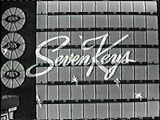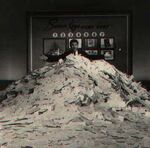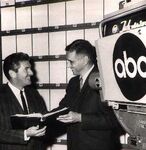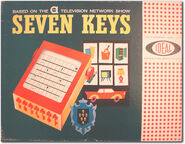| Host | |
| Jack Narz | |
| Models | |
| Betty Andrews Barbara Lyon | |
| Announcer | |
| Jack Powers | |
| Broadcast | |
| KTLA Primetime (Daily): 9/12/1960 – 4/28/1961, 4/6/1964 – 1/15/1965 ABC Daytime: 4/3/1961 – 3/27/1964 | |
| Packagers | |
| Wellington Productions/Paramount Television | |
Seven Keys was a game show based on the board game Chutes and Ladders.
Gameplay
One contestant attempted to advance along a 70-square board by identifying the pictures on certain squares. The contestant hit a button to stop a spinning dial and moved the number of spaces shown, from 1 to 10.
The content of the boards varied. Some had pictures of celebrities and others had word puzzles. One board required the contestant to determine which celebrity in a pair was missing, while another dealt with the United States and their capitals.
Each stop took one turn, and contestants had 15 turns to get to the last square, with a counter at the top of the board to keep track. If the contestant landed on a space more than once, it was a free move.
Reaching the final space earned one of the "Seven Keys", each of which corresponded to a particular lock that a prize was behind. Six of the keys unlocked various smaller prizes while one unlocked a large prize package that changed with each new contestant. Unlike Chutes & Ladders, contestants were not required to reach the final space by exact count.
Contestants could stop at any point and take any keys accumulated (and whatever prizes they opened, including the grand prize, if that key was collected). If a contestant failed to reach the final square within fifteen turns, all earned keys were lost.
Special spaces
- Bonus: The contestant stopped a spinning dial marked "Bonus", and moved that many steps on the same turn the bonus was landed on.
- Penalty: The contestant stopped a spinning dial marked "Penalty", and moved back that many spaces.
- Safety: This was the first space of each row. A miss took the contestant back to the last Safety space reached; if it was landed on, however, the contestant simply took his/her next turn.
- Keys: The final space, which awarded a key of the contestant's choosing if reached.
Home game
Between the first and second games of the day, home viewers had the chance to play for a $1,000 mink stole. Viewers sent in postcards with their name, address, and the key they would like to use, from 1 to 7. If any of these three elements were missing, the card was rendered void and another was picked.
Once a properly-filled postcard was selected, host Narz moved over to a board showing, much like the main game, seven keys and their respective locks. Narz would show the card to the camera, then select the key specified by the home viewer and try to unlock the stole. If unlocked, the stole would be sent to the home viewer; otherwise, Narz would continue trying to open locks until the one associated with the key was found, with that prize being sent to the home viewer. After the prize was described, Narz would show the audience which key was the correct one and unlock the mink stole as proof.
Studio
ABC Television Center, Los Angeles, CA
Press Photos
Merchandise
A board game was released by Ideal in 1961.
YouTube Links
A full episode from September 22, 1960
A full episode from February 10, 1961
A full episode from July 12, 1962
Intro to above episode
A full episode from May 24, 1963 (audio only)





